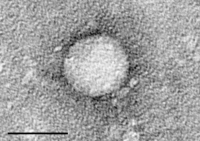
Depletion of TRRAP Induces p53‐Independent Senescence in Liver Cancer by Down‐Regulating Mitotic Genes
Sign Up to like & getrecommendations! Published in 2019 at "Hepatology"
DOI: 10.1002/hep.30807
Abstract: Hepatocellular carcinoma (HCC) is an aggressive subtype of liver cancer with few effective treatments, and the underlying mechanisms that drive HCC pathogenesis remain poorly characterized. Identifying genes and pathways essential for HCC cell growth will… read more here.
Keywords: trrap; hcc cell; cancer; mitotic genes ... See more keywords

Activation of EGFR‐KLF4 positive feedback loop results in acquired resistance to sorafenib in hepatocellular carcinoma
Sign Up to like & getrecommendations! Published in 2019 at "Molecular Carcinogenesis"
DOI: 10.1002/mc.23102
Abstract: Sorafenib is the standard first‐line systemic chemotherapeutic drugs for advanced hepatocellular carcinoma (HCC), but acquired resistance to sorafenib is frequently observed in clinical practice. In this study, we first produced three sorafenib resistance (SR) HCC… read more here.
Keywords: positive feedback; hcc; feedback loop; sorafenib ... See more keywords

ADAM9 mediates the interleukin-6-induced Epithelial-Mesenchymal transition and metastasis through ROS production in hepatoma cells.
Sign Up to like & getrecommendations! Published in 2018 at "Cancer letters"
DOI: 10.1016/j.canlet.2018.02.010
Abstract: Interleukin (IL)-6 has been implicated in the invasion and metastasis of hepatocellular carcinoma (HCC). However, the molecular events that mediate this process are poorly understood. Here, we showed that IL-6 promoted the epithelial-mesenchymal transition (EMT)… read more here.
Keywords: mesenchymal transition; hcc; metastasis; hcc cell ... See more keywords

Berbamine (BBM), a Natural STAT3 Inhibitor, Synergistically Enhances the Antigrowth and Proapoptotic Effects of Sorafenib on Hepatocellular Carcinoma Cells
Sign Up to like & getrecommendations! Published in 2020 at "ACS Omega"
DOI: 10.1021/acsomega.0c03527
Abstract: Sorafenib (SORA), a multi kinase inhibitor, is the standard first-line targeted therapy approved by the Food and Drug Administration for advanced hepatocellular carcinoma (HCC). However, emerging evidence from clinical practice indicates that SORA alone has… read more here.
Keywords: hepatocellular carcinoma; hcc; cell lines; stat3 ... See more keywords

Hepatic stellate cell‐released CXCL1 aggravates HCC malignant behaviors through the MIR4435‐2HG/miR‐506‐3p/TGFB1 axis
Sign Up to like & getrecommendations! Published in 2022 at "Cancer Science"
DOI: 10.1111/cas.15605
Abstract: Hepatic stellate cell (HSC) activation is a critical event in the development of hepatic fibrosis and hepatocellular carcinoma (HCC). By the release of soluble cytokines, chemokines, and chemotaxis, HSCs affect HCC cell phenotypes through a… read more here.
Keywords: mir 506; hcc cell; hcc; mir4435 2hg ... See more keywords

Abstract 3517: Targeting pH regulators to modulate human hepatocellular carcinoma microenvironment
Sign Up to like & getrecommendations! Published in 2018 at "Cancer Research"
DOI: 10.1158/1538-7445.am2018-3517
Abstract: Hepatocellular carcinoma (HCC) arises in a hypoxic/acidic microenvironment in which the pO2 is about 0.8%. This condition favors tumor progression and fosters immunosuppression. Tumor cells survive this obstile environment by overexpressing pH regulators such as… read more here.
Keywords: hepatocellular carcinoma; microenvironment; hcc; atpase ... See more keywords

LncRNA HOXD-AS1 promotes the metastasis of human hepatocellular carcinoma via modulating miR-326/SLC27A4
Sign Up to like & getrecommendations! Published in 2020 at "Cancer Cell International"
DOI: 10.1186/s12935-020-01217-8
Abstract: Background Mounting evidences have indicated that long non-coding RNA (lncRNA) HOXD cluster antisense RNA 1 (HOXD-AS1) is dysregulated and participates into the progression of cancers. This study aims to investigate the biological roles and mechanisms… read more here.
Keywords: mir 326; hcc cell; as1; hoxd as1 ... See more keywords

Gly-tRF enhances LCSC-like properties and promotes HCC cells migration by targeting NDFIP2
Sign Up to like & getrecommendations! Published in 2021 at "Cancer Cell International"
DOI: 10.1186/s12935-021-02102-8
Abstract: Background Accumulating evidence demonstrates that tRFs (tRNA-derived small RNA fragments) and tiRNAs (tRNA-derived stress-induced RNA), an emerging category of regulatory RNA molecules derived from transfer RNAs (tRNAs), are dysregulated in in various human cancer types… read more here.
Keywords: hcc; migration; hcc cell; gly trf ... See more keywords

BRG1 promotes hepatocarcinogenesis by regulating proliferation and invasiveness
Sign Up to like & getrecommendations! Published in 2017 at "PLoS ONE"
DOI: 10.1371/journal.pone.0180225
Abstract: The chromatin remodeler complex SWI/SNF plays an important role in physiological and pathological processes. Brahma related gene 1(BRG1), a catalytic subunit of the SWI/SNF complex, is known to be mutated in hepatocellular carcinoma (HCC). However,… read more here.
Keywords: brg1; hcc; cell lines; hcc cell ... See more keywords

Laminin-332 γ2 Monomeric Chain Promotes Adhesion and Migration of Hepatocellular Carcinoma Cells
Sign Up to like & getrecommendations! Published in 2023 at "Cancers"
DOI: 10.3390/cancers15020373
Abstract: Simple Summary Extracellular matrix (ECM) molecules are believed to being critically involved in the progression of hepatocellular carcinoma (HCC). Laminin332 (Ln332) is an ECM protein complex that has been found to be implicated in the… read more here.
Keywords: hepatocellular carcinoma; hcc; hcc cell; ln332 ... See more keywords

IGF2BP3 and miR191-5p synergistically increase HCC cell invasiveness by altering ZO-1 expression
Sign Up to like & getrecommendations! Published in 2020 at "Oncology Letters"
DOI: 10.3892/ol.2020.11693
Abstract: Early studies have indicated that insulin-like growth factor II mRNA binding protein 3 (IGF2BP3/IMP3) may affect the progression of hepatocellular carcinoma (HCC); however, the detailed underlying mechanisms, particularly its linkage to tight junction protein-mediated cell… read more here.
Keywords: hcc; cell invasiveness; hcc cell; expression ... See more keywords